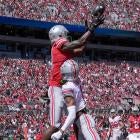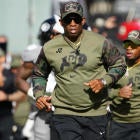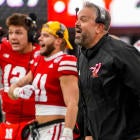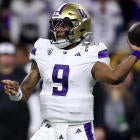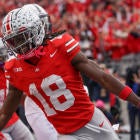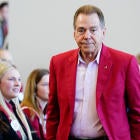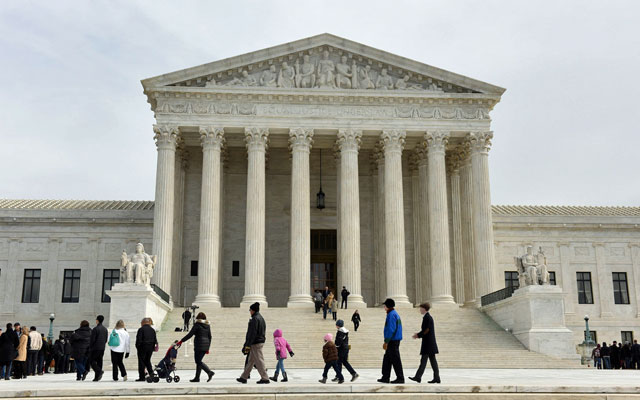
Lawyers for the Ed O’Bannon plaintiffs on Tuesday asked the Supreme Court to hear their antitrust case against the NCAA, a request that carries risks and rewards but no guarantee of even being heard.
Last fall, the Ninth Circuit Court of Appeals threw out U.S. District Judge Claudia Wilken's decision allowing college football and men’s basketball players to be paid up to $5,000 per year in deferred money. But the Ninth Circuit upheld that the NCAA's rules restricting payments to players violate antitrust laws. As it stands now, cost of attendance stipends -- since they are tied to education -- are the highest form of payment the NCAA must legally allow schools to offer players.
What does the O'Bannon petition mean? Some questions and answers follow.
What's at stake?
Should college athletes be allowed to get paid for use of their names, images and likenesses? The heart of the O'Bannon case was video games, but the allowance of money for players could be for any sort of merchandise. The Supreme Court only hears about 1 percent of petitioned cases so the odds are long for a review. But the Supreme Court does take high-profile cases and O'Bannon has been in the news since 2009.
What are risks and rewards for O'Bannon?
There are high risks and high rewards for both sides by appealing to the Supreme Court if the case gets heard.
O’Bannon's lawyers are still trying to collect $46 million in fees from the case. The NCAA has been trying to significant reduce the award amount. Going to the Supreme Court would risk O’Bannon’s victory in appellate court that the NCAA violated antitrust laws. A loss at the Supreme Court could wipe out the fees.
When asked if he’s concerned about losing the award, O'Bannon attorney Michael Hausfeld replied, “It’s a factor, but one definitely far outweighed by the need to bring some peace to the situation. There’s a fundamental, underlying principle that will never come to closure without either the Supreme Court making a finding on the underlying violation, or leaving the decision on the violation as is.”
In recent months, Hausfeld suggested publicly that O’Bannon wouldn’t petition the Supreme Court. “The more we saw how the NCAA was attempting to diminish the significance of the decision, avoid its consequences and its rational outcome, it became evident that the situation of college athletes would benefit considerably by a Supreme Court decision,” Hausfeld said.
What are risks and rewards for NCAA?
For the NCAA, a Supreme Court case carries a tremendous risk of having the higher court agree with Wilken that athletes should be allowed to get paid beyond cost of attendance. The NCAA has spent considerable time in recent years lobbying Congress, potentially for some sort of antitrust exemption if that day is ever needed. Congress isn't exactly passing legislation at breathtaking speed, though, and there's no certainty the NCAA could get freedom from these types of antitrust lawsuits in the future.
A win at the Supreme Court could strengthen or clarify how antitrust laws impact the NCAA. Because of the O'Bannon decision as it stands now, the NCAA can no linger cling to a 1984 Supreme Court ruling in Board of Regents vs. Oklahoma that the association used to defend amateurism for decades.
Earlier this month, the NCAA sought and received a deadline extension until April 14 to file a petition with the Supreme Court. The request signaled the NCAA plans to file, but the association hasn’t formally filed at this time. The NCAA has 30 days to respond to O'Bannon's petition.
“We are reviewing the petition and look forward to providing our response to the Supreme Court," NCAA chief legal officer Donald Remy said in a statement. "We also are continuing to consider whether to file our own petition asking the Court to review certain aspects of the Ninth Circuit’s decision. The NCAA operates well within the antitrust laws, and the Ninth Circuit’s decision holding that the NCAA is not required to allow compensation beyond cost of attendance was proper."
In their filing Tuesday, the O'Bannon plaintiffs wrote to the Supreme Court that the Ninth Circuit’s decision “departed from this Court’s decisions and from decisions in other circuits in rejecting a portion of the remedy” through the deferred payment plan.
The O’Bannon plaintiffs wrote that the Ninth Circuit incorrectly determined Wilken was wrong when she ruled that voluntary payments of up to $5,000 per year to players wouldn’t harm consumer demand for the NCAA’s product. Under that plan, the NCAA would have been allowed to set a cap on the money held in trust, but the cap could not be less than $5,000 in 2014 value for each year the players remain academically eligible.
In Sept. 2015, the Ninth Circuit panel of judges Sidney Thomas, Jay Bybee and Gordon Quist determined that cost of attendance was the proper compensation for college athletes. The panel voted 2-1 in favor of that position, with Thomas disagreeing.
“The difference between offering student-athletes education-related compensation and offering them cash sums untethered to educational expenses is not minor; it is a quantum leap,” Bybee wrote. “Once that line is crossed, we see no basis for returning to a rule of amateurism and no defined stopping point. … At that point, the NCAA will have surrendered its amateurism principles entirely and transitioned from its 'particular brand of football' to minor league status.”
Hausfeld said the 9th Circuit’s burden shift was “backwards” and the burden should have been on the NCAA to show why the remedy is inappropriate, “which the NCAA never did.” Also, Wilken has “a great deal of discretion in addressing a violation of the law,” Hausfeld said.
What does a split Supreme Court mean for O'Bannon?
The petition to the Supreme Court comes after Justice Antonin Scalia, a hard-line conservative, died last month. The court is essentially split now between four liberals and four conservatives, though the O’Bannon case wouldn’t necessarily fall along those ideological lines.
When asked if Scalia's death factored into the decision to petition the Supreme Court, Hausfeld replied, "No." At least four justices must vote to hear the case.
The O'Bannon plaintiffs are now using attorney Jonathan Massey, who has argued three cases before the Supreme Court. Massey was a law clerk to former Supreme Court Justice William Brennan.
The NCAA is being represented by Seth Waxman, the former U.S. solicitor general. Waxman has argued more than 65 times before the Supreme Court. He was hired in 2013 by the NCAA, which has eyed taking O'Bannon to the Supreme Court for years.
Follow and read more from Jon Solomon on Facebook and Twitter.












